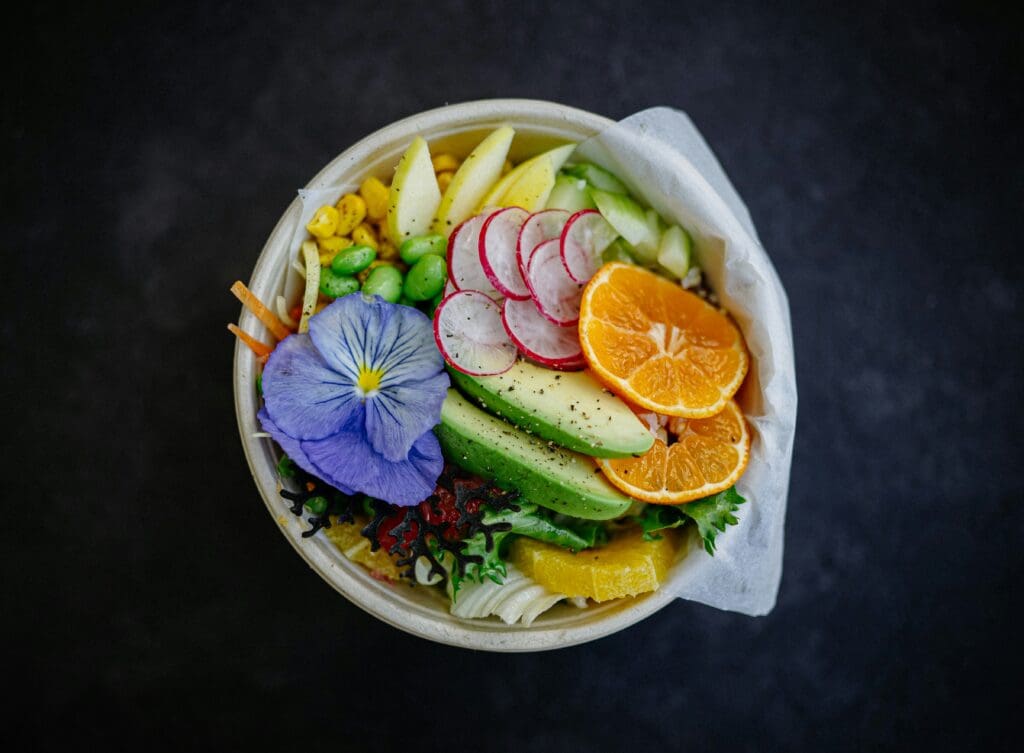
Navigating Endometriosis Through Nutrition
Living with endometriosis can be physically and emotionally challenging. From debilitating cramps to chronic fatigue, the condition often disrupts daily life, affecting work, relationships, and worship. Adopting a mindful approach to nutrition can be helpful. When you choose nutrient-dense foods and adopt supportive lifestyle habits, these support your body, manage symptoms and improve overall well-being.
In this guide, we’ll explore how different dietary choices can help care for your body in a way that honours both your health and faith.
What is endometriosis?
Endometriosis is a condition in which tissue similar to the lining of the uterus grows outside of it – often on the ovaries, fallopian tubes, or other areas in the pelvis. This misplaced tissue responds to hormonal changes, leading to:
- Heavy menstrual bleeding and intense cramps
- Chronic pelvic and lower back pain
- Bloating, digestive disturbances, and fatigue
The condition can affect women anywhere from puberty to menopause. While there is no known cure, nutritional strategies can help alleviate symptoms and improve quality of life.
Why nutrition matters
Nutrition plays an important role in both symptom management and overall health during endometriosis. Here’s why focusing on your diet can make a difference:
- Reducing inflammation: Chronic inflammation is a key feature of endometriosis. Anti-inflammatory foods can help lower pain and swelling.
- Addressing nutrient deficiencies: Heavy menstrual bleeding may deplete essential nutrients like iron. A well-planned diet replenishes these deficiencies.
- Supporting hormonal balance: High-fibre foods aid in eliminating excess oestrogen, reducing the hormonal imbalances that can exacerbate symptoms.
- Enhancing digestive health: A diet rich in fibre and probiotics can improve gut health, helping reduce bloating and discomfort.
- Boosting energy and mood: Balanced meals that combine proteins, healthy fats, and complex carbohydrates stabilise blood sugar levels and promote overall well-being.
Disclaimer: It’s important to note that while specific diets may improve symptoms for some, there isn’t any scientifically proven “cure” through diet alone. Over-restrictive diets, in particular, can lead to nutritional gaps and unsustainable practices, causing feelings of shame or guilt when they’re eventually abandoned. So, focus on maintaining a healthy lifestyle. This approach will support your overall well-being and meets all your nutritional needs in a way that works for you.
Foods for managing endometriosis
Iron-rich foods
Heavy menstrual bleeding can lead to iron deficiency, which may result in fatigue and compromised immunity. Consider food such as beans, nuts, and dried fruit, enjoy them as snacks or in salads. Additionally, foods rich in vitamin C, such as spinach and kale, aid the absorption of iron.
Tip: Create a vibrant salad with spinach, pomegranate seeds, walnuts, and a citrus dressing for an iron and vitamin C boost.
Fibre-rich foods
Food high in fibre can help remove excess oestrogen, which can lead to cramping and pain. Fruits, such as bananas, apples, and raspberries; vegetables, such as avocados, potatoes, and carrots; and chia seeds are good sources of fibre.
Tip: Start your day with a fibre-rich chia pudding topped with fresh berries, or snack on apple slices paired with almond butter.
Vitamin D
Vitamin D plays a role in reducing inflammation, and anti-inflammatory nutrients like omega-3 fatty acids can further help ease pain and discomfort. Oily fish, including salmon, mackerel, and sardines are rich in both vitamin D and omega-3 fatty acids. Egg yolks and liver are also traditional sources that deliver vitamin D alongside a host of other nutrients. Colourful produce like berries, citrus fruits, and leafy greens can provide antioxidants that combat inflammation.
Tip: Incorporate a serving of grilled salmon with a side of steamed broccoli and a citrus vinaigrette for a balanced, anti-inflammatory meal.
Lean proteins and healthy fats
Protein supports tissue repair and stabilises blood sugar, while healthy fats are essential for hormonal balance and reducing inflammation. For protein, opt to include chicken, turkey, tofu, lentils, or fish. Avocados, walnuts, flaxseeds, and olive oil are excellent choices of healthy fats.
Tip: Try a balanced plate of quinoa tossed with roasted vegetables, grilled chicken, and a drizzle of olive oil, or enjoy a hearty lentil soup enriched with leafy greens.
Foods to avoid
Artificial trans fats
Trans fats, found in processed treats like donuts, fries, and pastries, can increase inflammation and your risk of cardiovascular issues. Some evidence even links high trans fat consumption to a greater likelihood of endometriosis flare-ups. Opting for whole, natural foods instead can help keep your body in balance.
Red meat
Research suggests that having more than two servings of red meat a day – especially processed varieties – may heighten the risk of endometriosis symptoms. By choosing alternative protein sources like poultry, fish, legumes, or plant-based proteins, you can support a diet that promotes better inflammation control.
Caffeine
While the evidence isn’t conclusive, research hints that high caffeine intake might elevate oestrogen levels and increase the risk of endometriosis symptoms. Consider moderating your consumption. If you love your morning brew or a relaxing cup of tea, try switching to decaf versions to still enjoy those comforting sessions.
Processed foods
Processed foods are often high in unhealthy sugars and fats yet low in fiber and essential nutrients. They can trigger inflammation and pain, especially when they contain omega-6 fats from oils like corn, peanut, or cottonseed. In contrast, foods rich in omega-3s – such as walnuts, flaxseeds, and fish – are known to help reduce inflammation. Minimising crisps, pastries, candy, fried foods, and crackers in your diet may help ease endometriosis-related discomfort.
Embrace these gentle adjustments as part of your broader, balanced approach to health, keeping in mind that everybody is unique. Experiment with alternatives that not only nourish your body but also honor the wisdom of listening to your own needs.
Practical tips for optimising your diet
- Consider food pairings: Combine iron-rich foods with vitamin C sources (for example, spinach with citrus fruits) to enhance nutrient absorption.
- Smart swaps: Consider swapping out foods to find what works for you. For example, switching refined grains with whole grains like brown rice, quinoa, or whole wheat to sustain energy and support digestive health.
- Mediterranean diet: Some recommend Mediterranean diets as they prioritise whole, unprocessed foods that are naturally anti-inflammatory.
- Fibre considerations: Most benefit from increased fibre intake. but if your bowel is affected by endometriosis, too much fibre might worsen symptoms. Balance is key, and working with a specialist can help tailor your fibre intake!
- Chew thoroughly and eat slowly: Taking the time to chew your food and sit down for meals can significantly improve digestion and reduce symptoms like bloating and gas.
- Stay hydrated: Aim for at least 2 litres per day; a good water intake is key for nutrient transport and digestion. Add lemon or cucumber for extra benefits – 1but be cautious with constant citrus intake to protect your teeth
- Track your journey: Keep a food diary to note how specific foods affect your symptoms. This personalised approach can help you fine-tune your diet over time.
An Islamic perspective
In Islam, caring for our bodies is a sacred trust (amānah) from Allah ﷻ; a gift we are to nurture with love and gratitude. By choosing wholesome, balanced meals, you honor this divine blessing, supporting not only your physical well-being but also your spiritual health.
We understand that managing endometriosis can sometimes feel overwhelming. Al-ḥamdu lillāh, even in our moments of struggle, Islamic teachings remind us of Allah’s boundless mercy. Our beloved Prophet ﷺ said, “No fatigue, nor disease, nor sorrow, nor sadness, nor hurt, nor distress befalls a Muslim, even if it were the prick he receives from a thorn, but that Allah expiates some of his sins for that” and “Allah ﷻ is more merciful to His servants than a mother is to her child.” These beautiful reminder encourages us to be gentle with ourselves, trusting in Allah’s compassion as we navigate our challenges.
The Qurān lovingly advises us:
“O you who have believed, eat from the good things which We have provided for you and be grateful to Allah if it is [indeed] Him that you worship.” (Surah Al-Baqarah, 2:172)
This verse inspires us to choose foods that nourish our bodies and feed our souls, turning every meal into an act of worship and thankfulness. Remember, dear sisters, that as you journey through endometriosis, be kind to yourself. Embrace every small victory and trust that your efforts to care for your bod – —through balanced nutrition, prayer, and self-love – are a beautiful expression of gratitude and faith. You are deeply cherished, and every act of self-care reflects the love and mercy of Allah ﷻ.
Final thoughts
Managing endometriosis often calls for thoughtful lifestyle changes, especially when it comes to your diet. Remember to listen closely to your body – its signals are the best guide in choosing the foods that make you feel nourished and supported.
Honour your body by providing it with essential nutrients to help ease inflammation and manage symptoms. While some challenges may persist, being mindful of what you eat and how different foods affect you is key. Everyone’s body responds in its own way, so it’s perfectly okay if what works for one person isn’t the best for you.
Personalise your journey with compassion and curiosity. Experiment with new foods and recipes, and don’t be afraid to step out of your comfort zone. Every mindful choice you make is a step toward nurturing your health, empowering you to feel your best.

